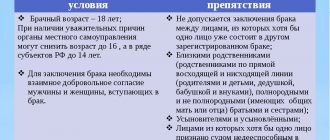General characteristics of the rights and obligations of spouses
The main feature is the reciprocity of rights and obligations. Since spouses have equal rights, then, as a general rule, the distribution of rights and responsibilities occurs in equal shares.
Equality of relations can be manifested, for example, in the choice of profession, place of residence and stay, and the purchase of property.
However, some rights and obligations can only be exercised by one of the parties to the marriage relationship. For example, the birth of a child and its feeding are carried out by the mother.
Three family models
Marital responsibilities are not limited to building a house, conceiving children and growing an orchard. In a family, it is important to be able to find a compromise, respect the interests of your other half, but not forget about yourself.
There are three family models.
1. The hostess and the lazy cat . “Cat Man” skillfully shirks household duties.
A recess has already formed on the sofa that follows the contours of his body, and he can press the remote control buttons without looking.
If still chilled beer flew into your hands on its own, life would be paradise.
Well, the wife is the many-armed goddess Kali, she can handle it! And in general: it’s not a man’s job to vacuum and clean up crumbs after yourself.
2. Dragonfly and ant . The relationship rests on the shoulders of the economic man, and the wife does whatever she wants - just not family.
Endless shopping trips, chatting on the phone, Brazilian TV series - this is how the day of the white-handed wife goes. It is useless to reproach her; you have to patiently accustom her to new responsibilities.
3. Balance . The couple has already hit dozens of bumps, but they have learned to properly distribute responsibilities.
Someone negotiates peacefully, someone draws up a duty schedule - it is important that the system works and neither party feels disadvantaged.
Personal rights and obligations
Marriage relationships involve mutual respect, help and support from the family. For example, raising children falls on the shoulders of both parties. The well-being of a family can only be achieved through the mutual fulfillment of the responsibilities that are assigned to this family.
Among the personal rights of spouses one can note:
- The right to choose the surname of the spouses.
- The right to choose an occupation, for example, to study at an educational institution.
- The right to choose a profession.
- The right to choose where to live and raise a child.
- The right to choose an educational institution for a child.
- The right to rest and restoration of health.
- The right to religious education of a child.
Mutual responsibilities include:
- Responsibility to support the family.
- Responsibilities to raise joint children.
- Respect each other and take care of family members.
- Take care of the well-being of family members and children.
Very little attention is paid to family law in the standards of secondary education programs. At the same time, this topic is a favorite for the compilers of the Unified State Exam KIMs and assignments for the All-Russian Olympiads for schoolchildren and other Olympiads on the first list in the Russian Federation.
In task 28 of the Unified State Exam in social studies there is even a special question that requires you to draw up a plan on a similar topic (it sounds similar to this: Legal regulation of relations between spouses (Procedure and conditions for divorce / Marriage as an institution of law)
- Marriage as the basis for the legal regulation of relations between spouses.
- Conditions for marriage:
- mutual and voluntary consent;
- reaching the marriageable age of those entering into marriage;
- absence of circumstances preventing marriage (close relationship, mental illness).
- Property rights and obligations of spouses:
- for material support of the other spouse and children, alimony obligations
- regarding matrimonial property
- Personal (non-property) rights and obligations of spouses;
- Each spouse is free to choose his occupation, place of residence and stay
- surname is optional
- spouses are obliged to build relationships in the family on the basis of mutual respect and mutual assistance, and are obliged to take care of the well-being of the family and children
- Regime of property of spouses:
- legal (established by the Family Code of the Russian Federation);
- contractual (established by the marriage contract).
- The procedure for ending a marriage in the Russian Federation
- death of a spouse;
- the court declares one of the spouses dead;
- dissolution of marriage (divorce).
- Grounds for divorce in the registry office:
- with mutual consent to divorce spouses who do not have common minor children;
- at the request of one of the spouses, regardless of whether the spouses have common minor children, it is carried out in the civil registry office, if the other spouse is recognized by the court as missing, or declared incompetent by the court, or sentenced to imprisonment for a term of over three years for committing a crime.
- Grounds for divorce in court:
- if spouses have common minor children
- in the absence of consent of one of the spouses to divorce.
- if one of the spouses, despite his lack of objections, evades divorce from the civil registry office.
What rights and obligations of spouses are considered property rights?
There are two large groups of rights:
1). For material support of the other spouse and children, alimony obligations
2). Regarding matrimonial property
As a general rule, property acquired by spouses during marriage is their common joint property, unless an agreement between them establishes a different regime for this property (Article 256 of the Civil Code). Thus, spouses can, by concluding a marriage contract, establish a legal regime of common shared or separate ownership of all property acquired during marriage (Chapter 8 of the Family Code).
Children do not have any property rights to family property. Only in certain cases provided for by law, children may have ownership rights to part of this property. So, in accordance with Art. 257 of the Civil Code, the property of a peasant (farm) enterprise belongs to its members (including minor children) on the right of joint ownership, unless otherwise established by law or an agreement between them.
When housing is privatized, children who permanently live with their parents also become subjects of the right of common shared or joint ownership of an apartment. In addition, children may own property that they received by inheritance or as a gift, in the form of earnings, or scholarships.
In addition to common property, each spouse has the right to have personal property, which consists of:
- from property that belonged to the spouse before marriage;
- property received during marriage as a gift or by inheritance;
- personal items (clothing, shoes, etc.), except for jewelry and luxury items.
This property is excluded from common joint property, and the spouse has the right to own, use and dispose of it at his own discretion. But if investments have been made into personal property at the expense of the other spouse, significantly increasing its value, it can be recognized by the court as common joint property (for example, if a wife paid for major repairs of an apartment that belonged to her husband before marriage, then this apartment will become common joint property spouses).
| LAW: ESSENTIAL CRIME |
In accordance with Art. 253 of the Civil Code of the Russian Federation, the disposal of jointly owned property is carried out with the consent of the spouses, i.e. it is understood that the transaction carried out by one spouse to dispose of the common property is carried out with the consent of the other spouse. A transaction can be declared invalid by a court only if the court finds that the spouse who made the transaction was dishonest.
It is likely that not all property located in the house will constitute the common joint property of the spouses or be their personal property. Any thing, and indeed any other object of civil rights, acquired in compliance with the procedure and grounds established by the Civil Code of the Russian Federation, can become the property of other family members (after all, the quantity and value of property owned by a citizen is not limited). Therefore, a three-year-old child can own not only toys given to him by his parents, but also, for example, a car received under a will from his grandfather (however, the grandson will not be able to dispose of this car independently until a certain time).
Section V of the Family Code regulates the child support obligations of parents and children. Parents are obliged to support their minor children and adults if they are disabled and need financial assistance. The law determines the procedure for establishing the amount of maintenance and compulsory collection from the defendant if maintenance is not provided voluntarily.
What are the specifics of personal non-property rights?
Personal non-property rights are understood as rights enshrined in family law that affect the personal interests of spouses, the basis of which is the actions and actions of participants in family relations approved by the state, and constituting the internal basis of family life. Personal non-property rights include:
- The right of the spouse to choose his occupation;
- Obtain a profession of your choice;
- Choose a place of residence and a place of stay, that is, decide for yourself the question of where to live and whether to live together with the other spouse or separately from him;
- The right of spouses to equality when resolving issues: raising and educating children; paternity and maternity; family planning; distribution of the family budget; housekeeping; other issues of family life;
These personal non-property rights cannot be the subject of a marriage contract or other transactions. Closely related to personal non-property rights are the following responsibilities of spouses:
- The obligation not to interfere with the other spouse’s exercise of personal non-property rights;
- Provide each other with mutual moral support;
- Promote the material well-being of the family;
- Promote the comprehensive spiritual, moral and physical development of all family members.
The personal non-property rights of spouses are closely related to the personality of each of them and are elements of the legal status of a citizen (Articles 19, 27 and 37 of the Constitution). They cannot be canceled or changed in connection with a citizen’s marriage. The disagreement of one of the spouses with the choice of the other spouse has no legal consequences.
| POLITICAL IDEOLOGIES: HOW BELIEF SYSTEMS CHANGE THE FIELD OF POLITICS |
The legislation is based on the complete equality of spouses in the family and establishes that issues of motherhood, paternity, upbringing, education of children and other issues of family life are resolved by the spouses jointly, that is, by mutual consent. The equality of spouses in the family is not only enshrined as a general principle, but is also guaranteed in all areas of family relations.
Much in the family depends on the joint efforts of both spouses. Spouses are obliged to build their relationship on the basis of mutual respect and mutual assistance, to promote the well-being and strengthening of the family, to take care of the well-being and development of their children (clause 3 of Article 31 of the Family Code). Misbehavior of one of the spouses in the family can lead to a number of negative legal consequences for him. For example, the court has the right to release a spouse from the obligation to support another spouse - disabled and in need, if he behaved unworthily in the family: he was constantly drunk, spent property to the detriment of his family, treated his wife cruelly, etc.
One of the basic personal rights of spouses is the right to choose a surname upon marriage. In accordance with Russian legislation, the choice of a surname depends solely on the will of those entering into marriage. Each of them - this applies equally to both husband and wife - independently determines whether upon marriage he will retain his premarital surname or take the surname of the other spouse as a common surname. In most cases, spouses adopt a common surname. A common surname emphasizes the common interests of all family members and facilitates the implementation of the rights and responsibilities of spouses, parents and children.
As a common surname, spouses also have the right to choose a double surname, combining the surnames of the spouses, if the law of the subject of the Russian Federation in whose territory the marriage takes place does not prohibit combining surnames. Currently, such a ban has not been established in any subject of the Russian Federation. This general rule has one exception: if the surname of one of the spouses is already double, further joining of surnames is not allowed (Article 32 of the Family Code).
A change by one of the spouses during the marriage of his surname does not automatically entail a change in the surname of the other spouse and their common minor children. Spouses freely and independently decide on the issue of a surname in the event of divorce. Each spouse can, after a divorce, keep the surname he adopted at the time of marriage, or ask that his premarital surname be restored to him. The consent of the other spouse for the divorced spouse to retain his surname is not required.
The issue of changing the surname of a child under 14 years of age after the divorce of his parents, if the child and the parent with whom the child remains to live have different surnames, is decided by the guardianship and trusteeship authority based on the interests of the child and taking into account the opinion of the other parent whose surname he bears. child (Article 59 SK). A child who has reached the age of 14 years and has received a passport has the right to apply to the civil registry office with a request to change his surname. In this case, the consent of his parents is required, and in the absence of such consent, a court decision.
Property rights and obligations
From the moment of marriage, everything acquired by the spouses during marriage will be considered joint property. The legal regime of property rights and obligations becomes joint and in order to dispose of such property, the consent of the other party to the marriage relationship is required.
We recommend! Social protection of children left without parents
The property rights of spouses include:
- The right to real estate, house, apartment, summer cottage.
- Right to a vehicle.
- Right to furniture.
- Right to income.
- The right to engage in entrepreneurial activity.
- The right to run a household.
- The right to farm.
The property responsibilities of spouses include the following::
- Responsibility to support the family.
- The obligation to use the income received by the family, with the exception of gifts and inheritance.
- Obligation to pay property taxes.
- Responsibility to manage family businesses.
Measures to protect marital rights
Family and matrimonial rights are personal in nature, which means they can be violated. In this regard, there are legal measures that will stop/prevent violations of family rights.
There are no separate articles of law that allow regulating this issue. However, this is stated in other articles of the RF IC, which regulate the rights and rights of spouses.
The following measures are being taken to protect marital rights:
- Protection of rights to common property is implemented through the division of property of spouses (Article 38 of the RF IC).
- Through the court, you can cancel the marriage contract or declare it invalid (Article 43, RF IC).
- You can protect your right to maintenance by collecting alimony for yourself and the child (Article 80, RF IC)
- Establishing paternity is used as a measure to protect the rights of the child (Article 49 of the RF IC).
- The protection of parental rights is implemented through the removal of a child from the person illegally detaining him (Article 68 of the RF IC).
- A marriage can be declared invalid, with all the ensuing consequences of such a decision (Article 30 of the RF IC).
Why does a man need a family?
- The most obvious answer is that family is the place where a man is surrounded by family. Where he can come to rest and relax;
- There is a favorable psychological climate in the family, in which the woman is his comrade-in-arms, creates conditions for relaxation, and helps to conduct his business;
- A strong family is a way to continue your family line, raise children who in the future will be able to continue their father’s work;
- The family helps a man to realize the qualities of a leader, if he has them, and if they are not enough, to acquire them.
Alimony to the wife of a disabled person and a pensioner
So let's repeat. According to Article No. 90 of the RF IC (clause 1), an ex-wife has the right to receive alimony from her ex-husband if:
- became disabled during marriage or the first year after divorce
- reached retirement age less than 5 years after the divorce, in cases where the marriage lasted long enough
How much alimony will a disabled wife and a pensioner receive from her husband?
As in most “alimony” articles, No. 90 (clause 1) of the RF IC does not provide any specific amounts. It only states that former spouses can:
- reach an independent agreement on an amount that suits both (orally or in written, notarized form)
- go to court, which will calculate a fixed alimony rate based on the specific situation
ATTENTION! The law does not provide for either a maximum or minimum amount of such alimony. If the ex-spouse is wealthy and compassionate, he may voluntarily provide the disabled ex-wife with enough money so that she does not need it (but in such cases there is usually no need to resort to court assistance). The court usually assigns small amounts (a percentage of the PM). If the ex-husband is a pensioner himself without additional income (or with unofficial income, the presence of which cannot be proven), he will not receive alimony at all.
How to file for alimony for wife maintenance?
If it was not possible to conclude a voluntary agreement, you can (and should) try to protect your rights through the court.
Procedure
If you have already had experience in filing a claim in court for child support, we will not tell you anything fundamentally new - everything is done in approximately the same way.
The only thing is that it is still worth seeking free legal advice on our portal. Firstly, the lawyer will analyze a specific situation from the right point of view, predict the chances of success, and give practical advice. Secondly, confirmation by a specialist that you are right will give you confidence and help you overcome difficulties.
Next everything is according to plan:
- Prepare a claim (more on that below)
- Collect all necessary documents proving your disability and need, or pregnancy and presence of children in need of care
- Pay the fee
- Submit the claim, accompanying documents, and a receipt for payment of the fee to the court office (it is advisable to do this at your husband’s place of residence, but you can do it in your own way if you are disabled or “home-bound” by children)
- Wait until you receive notification of the place and time of the meeting (usually the meeting is scheduled a month after filing the claim)
- Take part in a meeting or meetings (sometimes a case requires several). If there are several hearings, behave correctly towards the court (this is important). For example, if you cannot arrive at court at the time specified in the agenda, notify the court about this in advance and ask to postpone the hearing.
- After a positive decision has been made for you, take the writ of execution and bring it to the FSSP so that the bailiffs can forcibly collect alimony from the defendant
Statement of claim
The requirements for it are determined by articles of the Code of Civil Procedure of the Russian Federation No. 131 and 132.
ATTENTION! Use a business-like formal style, avoid corrections and erasures, follow the order in which the facts of the case are presented. Make sure that all necessary information is provided. You can use a sample from the Internet or order a free consultation with a lawyer who will help you.
The procedure for presenting information and facts in a statement of claim:
- “Hat” is the full name of the judicial body to which you are applying
- Your passport and contact details
- Passport and contact details of the defendant
- “Claim for alimony” is a preparation
- Next, proceed to a statement of the circumstances of the case. First of all, you should indicate the date of registration of marriage and divorce, the length of time you were married. Then, depending on the circumstances:
- Pregnancy
- Having small children or disabled children
- Own disability or retirement age
- Information about needs and needs that cannot be satisfied
- Mention of the provisions of articles of the RF IC No. 89-91, which serve as the basis for collecting alimony in your favor
- Claim for the recovery of alimony from a former or current husband
- List of documentary attachments to the claim
- Date and signature
Documentation
Article No. 132 of the Code of Civil Procedure of the Russian Federation requires documentary evidence of the circumstances set out in the claim. Therefore, it is necessary to prepare copies of:
- Passports (all)
- Marriage or divorce certificates (all)
- Children's birth certificates (if child support is related to child care)
- Pension or disability certificate (if alimony is related to disability)
And also information:
- from the housing office about family composition
- about income (your own and the defendant’s, if possible)
- medical evidence confirming the need for treatment
ATTENTION! Each specific situation may require additional documents that will have a positive impact on the very fact of receiving alimony and its amount. It is better to consult with a lawyer about this in advance.
Procedure
During the hearing(s), the court considers the claim, listens to the parties' arguments, and may require additional documents or call witnesses.
The defendant has the right to file a counterclaim, and both parties have the right to file motions for whatever they see fit. Throughout the process, the plaintiff and defendant can negotiate and enter into a settlement agreement. If it is drawn up correctly and does not infringe on the rights of any of the parties, the court will approve it.
Otherwise, after a comprehensive review of the case, the court will decide to pay alimony or refuse to pay.
Deadlines
As a rule, court decisions come into force within a month. Child support cases are an exception. Decisions on this matter come into effect immediately. Immediately after receiving the verdict, you can go to the FSSP and submit an application for forced collection of the due amount.
When exactly the money will be transferred depends on how the bailiffs work. This usually occurs 1-3 months after the application is submitted.
Expenses
The alimony process is not one of the “expensive” ones. According to the Tax Code of the Russian Federation (Article No. 333, paragraph 1, paragraph 14), the fee is 150 rubles. In the case where alimony is required by both mother and child - 300 rubles.
But, if the claim is satisfied, the fee will be collected from the defendant, the plaintiff will not have to pay.
Additional costs may include postal, stationery (for copies), notary (if a power of attorney is issued or certification of documents is required). In the case of legal support, this is a fee for the lawyer.
Amount of alimony
When calculating a specific amount, the court takes into account the following details characterizing the defendant:
- His health and age
- Duration of marriage
- Current marital status (presence of children and dependents)
- Amount of income, presence of other alimony obligations or debts
- Other circumstances depending on the situation
ATTENTION! The amount of alimony ordered by the court to a wife is fixed as a “fixed” amount and can vary from several hundred to several thousand rubles. In practice, he almost never reaches the PM. If the ex-husband has the financial ability to pay more, it is reasonable to agree on this voluntarily.
The procedure for forced collection of alimony
It is no different from the forced collection of child support.
After receiving a positive court decision, the plaintiff applies to the FSSP to open enforcement proceedings. Deductions are made from the salary, pension, or any official income of the defendant. The funds are transferred to the plaintiff.
Division of responsibilities in the family
If the head of the family has rights, and the rest have only responsibilities, the situation needs to be changed. For some reason, 50% of men believe that only they get tired. The breadwinner comes home from work - his wife should flutter around him like a butterfly around a flower.
She doesn't overwork herself. He will serve eight hours in the office and another two in transport. But there are still fourteen hours in the day!
A man doesn’t want to do at least some of the housework? Do not rush to blame him for all sins.
It must be besieged as an impregnable fortress. Think carefully about your arguments and draw up a clear negotiation plan.
Try to convince your loved one that no one will choose and cook meat better than him. It’s not for nothing that representatives of the stronger sex are considered the best cooks.
Or shopping: you can choose a dress or shoes yourself, but dragging heavy bags of groceries is not at all a woman’s job.
Make an argument that even a completely healthy woman is contraindicated from wearing weights. Don’t forget to praise your man: like a cat, you only need to stroke his fur.
Did you nail the shelf? – “My hero!” Have you changed your baby's diaper? - “How wonderful you are!” Let him consider performing simple duties a feat, it will only benefit you!
But ultimatums, “sawfish” and “Indian on the warpath” modes will give the opposite result. In 90 cases out of 100, after extensive brainwashing, a man cannot be torn away from his favorite chair even with a jack.
And the beloved can be indignant as much as she wants, threaten to go to her mother and call all heavenly punishments on his head.
Mixing roles
Mixing roles is when a man performs part of a woman's responsibilities, and vice versa. It is allowed in small quantities. For example, when a spouse gets sick, the spouse is obliged to look after her and also do household chores.
At the same time, mixing roles is a negative phenomenon if it is abused. If this process occurs on an ongoing basis, children grow up with displaced concepts. Often homosexuals grow up in such families. To prevent this, you should pay attention to your responsibilities and adhere to them.
Moral Obligations
Material well-being, a cozy environment, well-mannered children are the components of family happiness. However, in addition to everyday worries, every married couple must have spiritual responsibilities, for which the husband and wife bear mutual responsibility, because they cannot be divided into male and female:
Marriage bonds are sealed not only by a stamp in the passport, but also by love for each other.
In order for the family to become a reliable rear, a cozy haven, spouses must:
- show love, respect;
- support, help solve problems;
- remain faithful;
- respect your partner’s personal space;
- be honest, sincere, attentive;
- strive to become one.
A family is a separate state, with rules of behavior, laws, and orders. To prevent peace from being disturbed by “military actions,” spouses must try to listen and hear, make compromises, and be able to negotiate.
Required qualities
The following qualities help a man to carry out marital duties without difficulty:
- awareness of the meaning of human existence (men in particular). It is necessary to determine the purpose of life. A man is the foundation, the head of the family. The correct development of family relationships depends on determination and rationality;
- the ability to sacrifice one’s own interests for the well-being of loved ones. Set priorities correctly. Realize that satisfying spiritual needs is as important as physical needs;
- having reasonable generosity. Responsible for the financial stability of the family budget, combine prudence and savings with meeting the needs of family members.
To become a good wife, a woman will have to learn to transform herself:
- play the role of a wife, calmly reminding the spouse of duties, goals, and responsibilities;
- become a sexual mistress so that the husband does not want to look for satisfaction on the side;
- learn to be a daughter. In moments of irritation, the spouse unquestioningly fulfills wishes, shows humility, obedience;
- help with advice, moral support as a friend or sister;
- show maternal care and affection during illness, momentary weakness, or depression.
The many faces of a loving spouse should be sincere, not false. Sacrifice, like a boomerang, will return to a woman with male gratitude, devotion, and care.
Responsibilities of a wife
Usually, the egoism in each of the spouses goes off scale, and we understand what the other half owes, but we often forget our obligations or agree to fulfill them under certain conditions. As a rule, let the husband start, and I will do it later. But this is a road to nowhere.
A woman’s psychology is more flexible, so the happiness of the family is often in the hands of the weaker sex. Just take the first steps and your life will change. So, the duties of a wife in the family are contained in simple rules:
- to be beautiful and happy;
- do household chores;
- inspire your husband;
- fulfill marital duty in bed;
- raise children;
- take care of family and friends.
Be beautiful and happy
Do you remember yourself on the day of your first date with your husband? What were you like then? And now? Often, women in marriage gain excess weight, stop taking care of themselves, and wear baggy clothes. When a child is born, many people completely forget about their needs. And now, after five years of marriage, the wife greets her husband from work in a stretched T-shirt and sweatpants, with an unwashed hair and a dull look. But men love with their eyes! Give yourself at least half an hour a day. A face mask, a trip to the hairdresser, or just a bath with aromatic oils will make your day brighter, fill you with positive energy, and being around a “filled” woman, your loved ones will automatically become happier.
My husband has a lot of female friends: is there a reason for concern or friendship between a man and a woman still happens?
Housekeeping
Washing dishes, cooking, washing and ironing clothes, creating comfort in the house are the direct responsibilities of a woman. Of course, a man can wash his own plate, but don't scold him if he doesn't. After all, he has many obligations of his own, which we will talk about a little later.
Inspire your husband
There is probably not a single family whose relationship has not been affected by the crisis. And the woman’s task is not to withdraw or start nagging her husband for every little thing, but, on the contrary, to help him open up. Don't sulk when his salary is barely enough, don't grumble about not throwing out the trash again or coming home late from football. Try to talk heart-to-heart with your loved one more often, softly, in a feminine way, preferably with “I-messages” - “I really want you to...”, “I would be glad if you...”. And where it seemed that a hurricane could destroy everything, the flowers of your love will begin to grow again.
A man also gets tired from constantly being in society, from physical labor, from stress at work. So make home a place where you want to return. Look good, cook your spouse's favorite dishes, be gentle and obedient - husbands like it.
8 things you shouldn't share with your loved one
Perform marital duty in bed
Today, more and more women push intimacy to the back burner or forget about it completely. Meanwhile, sex is very important for men. This is both a good release and satisfaction of a physiological need, as well as a sure way to feel loved. And how angry do they get when this right is suddenly taken away from them? They get irritated, angry, withdraw into themselves, and even worse towards other women. Therefore, pay more attention to your husband, and you will notice that the relationship becomes stronger and happiness increases.
Raise children
Perhaps the main responsibility of a woman is to give birth and raise children. What kind of family can we talk about if we don’t continue the family line?! Investing in your child all the best that is in you and your spouse, instilling love and kindness towards the world around you, raising a harmonious creative personality - this is what parents should strive for.
Take care of family and friends
Love your children more, give them warmth and time, and not tons of toys and gadgets. Spend your weekend in nature, put down your smartphone and just enjoy these minutes, because your children will quickly grow up and remember these moments as the best in life. Bake cookies, read books together, feed birds on the street - put light and joy into their hearts. Don’t forget about older relatives, visit and call more often. Remember, a woman creates the weather in the house, and whether it will be sunny or rainy depends only on her.
The husband has been “searching for himself” for a long time, and the wife is carrying everything on her shoulders: what should a woman do when the situation has dragged on?







